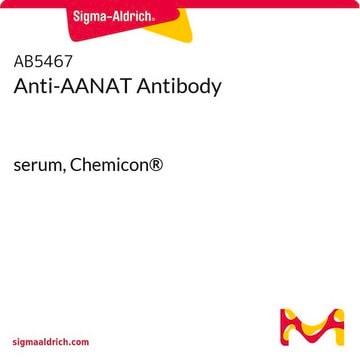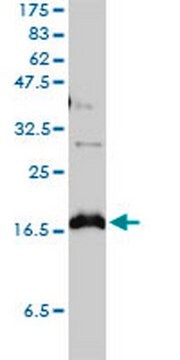05-412
Anti-GSK3 Antibody, clone 4G-1E
clone 4G-1E, Upstate®, from mouse
Synonyme(s) :
GSK-3 alpha, glycogen synthase kinase 3 alpha
About This Item
Produits recommandés
Source biologique
mouse
Niveau de qualité
Forme d'anticorps
purified immunoglobulin
Type de produit anticorps
primary antibodies
Clone
4G-1E, monoclonal
Espèces réactives
mouse, Dictyostelium sp., Schizosaccharomyces pombe, rat, vertebrates, human
Fabricant/nom de marque
Upstate®
Technique(s)
immunocytochemistry: suitable
western blot: suitable
Isotype
IgG1
Adéquation
not suitable for immunoprecipitation
Numéro d'accès NCBI
Numéro d'accès UniProt
Conditions d'expédition
dry ice
Modification post-traductionnelle de la cible
unmodified
Informations sur le gène
human ... GSK3A(2931)
mouse ... Gsk3A(606496)
rat ... Gsk3A(50686)
Catégories apparentées
Description générale
Spécificité
Immunogène
Application
Not recommended.
Immunocytochemistry:
10 µg/mL of a previous lot showed positive immunostaining for GSK3 in L6 cells fixed with acetone.
Signaling
PI3K, Akt, & mTOR Signaling
Qualité
Western Blot Analysis:
0.5-2 µg/mL of this lot detected GSK3 in RIPA lysates from human Jurkat cells; previously GSK3 was detected in RIPA lysates from human A431, rat L6 and PC12, and mouse 3T3 cells.
Description de la cible
Forme physique
Stockage et stabilité
Handling Recommendations: Upon receipt, and prior to removing the cap, centrifuge the vial and gently mix the solution. Aliquot into microcentrifuge tubes and store at -20°C. Avoid repeated freeze/thaw cycles, which may damage IgG and affect product performance.
Remarque sur l'analyse
Positive Antigen Control: Catalog #12-303, Jurkat cell lysate.
Autres remarques
Informations légales
Clause de non-responsabilité
Vous ne trouvez pas le bon produit ?
Essayez notre Outil de sélection de produits.
Code de la classe de stockage
12 - Non Combustible Liquids
Classe de danger pour l'eau (WGK)
WGK 1
Point d'éclair (°F)
Not applicable
Point d'éclair (°C)
Not applicable
Certificats d'analyse (COA)
Recherchez un Certificats d'analyse (COA) en saisissant le numéro de lot du produit. Les numéros de lot figurent sur l'étiquette du produit après les mots "Lot" ou "Batch".
Déjà en possession de ce produit ?
Retrouvez la documentation relative aux produits que vous avez récemment achetés dans la Bibliothèque de documents.
Notre équipe de scientifiques dispose d'une expérience dans tous les secteurs de la recherche, notamment en sciences de la vie, science des matériaux, synthèse chimique, chromatographie, analyse et dans de nombreux autres domaines..
Contacter notre Service technique








